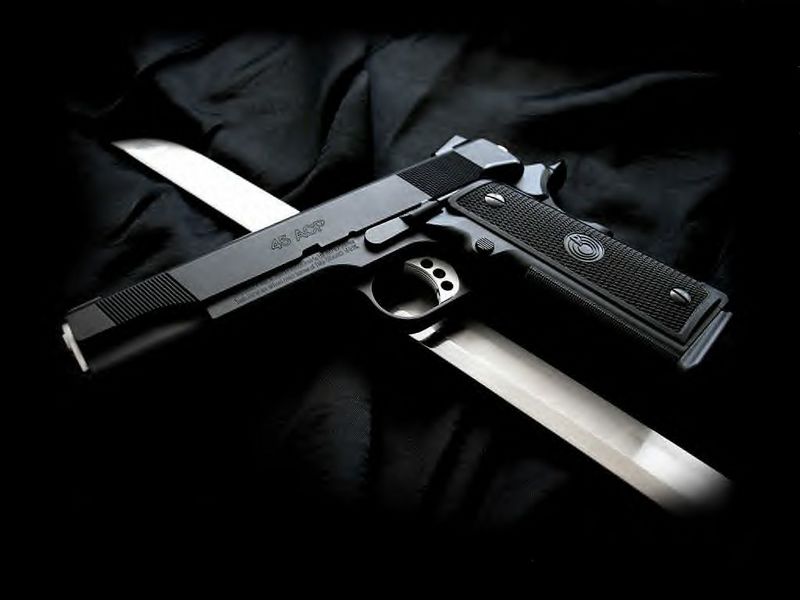 Luke
22:35-36 (NIV): Then Jesus asked them, "When I sent you
without
purse, bag or sandals, did you lack anything?" "Nothing," they
answered. He said to them, "But now if you have a
purse,
take it, and also a bag; and if you don't have a sword, sell your cloak
and buy one. It is written: 'And he was numbered with the
transgressors' ; and I tell you that this must be fulfilled in me. Yes,
what is written about me is reaching its fulfillment." The
disciples said, "See, Lord, here are two swords." "That is enough," he
replied.
Luke
22:35-36 (NIV): Then Jesus asked them, "When I sent you
without
purse, bag or sandals, did you lack anything?" "Nothing," they
answered. He said to them, "But now if you have a
purse,
take it, and also a bag; and if you don't have a sword, sell your cloak
and buy one. It is written: 'And he was numbered with the
transgressors' ; and I tell you that this must be fulfilled in me. Yes,
what is written about me is reaching its fulfillment." The
disciples said, "See, Lord, here are two swords." "That is enough," he
replied.So, what was Christ's purpose in telling his disciples to be armed? Some have said he gave this command so he could tell them later that they should not use them. However this makes no sense because Peter and the others were already armed. Furthermore, Jesus would have known - having traveled with them for years - what kind of weapons they carried. If Jesus did not want them to carry weapons, why didn't He address the issue in the three years they were together? Every other explanation I have seen falls just as flat.
So, I took a careful look at this passage - and this is what I found.
Point One: Christ's reference to their prior missionary journeys indicates that the need to be armed is directly related to their future missionary journeys.
Effectively, Jesus said, "Your last journey was easy (See Luke 10:1ff) - but, in the future you will need to be prepared. You will not have the support of most people."
Why would Jesus include a sword in the same category as money and camping gear? The answer is simple: Traveling the roads back then was a very risky endeavor. Robbers and bandits were very common (Paul mentions this in 2 Cor 11:26) and it was common for travelers to carry arms to protect themselves. After all, 911 wasn't available for about 1950 years! Travelers were on their own.
In short, the most logical reason - the one the fits the context best - is that the disciples needed to be able to defend themselves.
Point Two: The original Greek word (machaira) means any edged weapon or tool of any length.
While the context of most NT passages containing this word indicate that an edged weapon is in view, in many cases we cannot, in most cases, know how long the blade was. Looking at other Greek documents is very instructive.
"Homer mentions the makhaira, but as a domestic knife of no great size. In period texts, μάχαιρα has a variety of meanings, and can refer to virtually any knife or sword (taking the meaning of today's Greek μαχαίρι), even a surgeon's scalpel......."
As is the case today, a knife of - say four to five inches - would be suitable for defense, but also would be absolutely necessary for everyday use while the disciples traveled. It would likely be used for everything from cleaning fish to cutting cordage to cutting and eating food. It is certain that each disciple would have carried some kind of knife for daily use.
Point Three: The best interpretation of the disciples response is that each disciple possessed both a short and a long blade.
Let's examine the disciples response in Luke 22:38: 'The disciples said, "See, Lord, here are two swords." "That is enough," he (Jesus) replied.'
So what are the possible interpretations of this verse?
1) Between the eleven disciples then present, there were only two blades of any kind.
2) Between the eleven disciples then present, there were only two blades long enough to be useful for defense.
3) Each of the eleven disciples then present had two blades - one for every day use (a short, likely single edged knife) and a longer blade that would today be considered a long knife or a short sword.
We can rule out the first possibility as being impossible, because, as we have previously mentioned, at a minimum each disciple would need to have some kind of blade while traveling.
Moving on to the second possibility, this also does not fit. On their first journey, Jesus sent them out in groups of two. Both tradition and the New Testament (especially the Book of Acts) indicate that the disciples also traveled in groups of two to three. It therefore makes no sense for Jesus to approve of only two edged weapons, as this number would have many of the disciples defenseless.
The most logical interpretation is that when Jesus gave his command, the disciples each simply opened their garments and displayed both their every day blade and a longer blade - such as a long knife or a short sword. At the same time, they would have said, "See, I already have two blades." Seeing this, Jesus said that this was enough.
Conclusion: Jesus did tell his disciples to arm themselves in order to be able to defend themselves on the road in coming years.
Further support:
Then Simon Peter, who had a sword, drew it and struck the high priest’s servant, cutting off his right ear. (The servant’s name was Malchus.) Jesus commanded Peter, “Put your sword away! Shall I not drink the cup the Father has given me?” John 18:10-11
Here Peter rashly comes to the defense of Jesus. Rather than telling Peter that such action is always wrong, Jesus tells Peter that he should not interfere because He must endure what is coming. Critically, had Jesus intended that His disciples not be armed for self defense, there would be not better time for Him to have told Peter (and the other disciples) to get rid of their swords. He didn't do this.
Please note that this analysis is limited to this passage. The Bible has a great deal to say about how and when it is necessary and morally justified to use force, including deadly force. There are many good articles on the net that address this subject. I urge you to carefully read some of them. That said, there is no doubt in my mind that Jesus commanded his disciples to be armed.
What does this mean for Christians today?
First, it establishes that Christians may carry and use arms defensively - at least in some circumstances.
Second, the weapons Jesus spoke of were particularly suited for personal defense rather than offense. Jesus certainly was not advocating that the Christian faith be spread at the point of a sword - if this was his goal, spears and bows would have been needed. Additionally, when persecuted for their faith by governmental authorities, the Biblical record and history make it clear that Christians did not resist - just as Jesus did not resist.
Third, Christians need to be careful about advocating the disarmament of the public. While Christians can certainly disagree concerning gun laws, calls for total bans on the ownership and even the lawful carrying of firearms clearly violate the principle found here.








